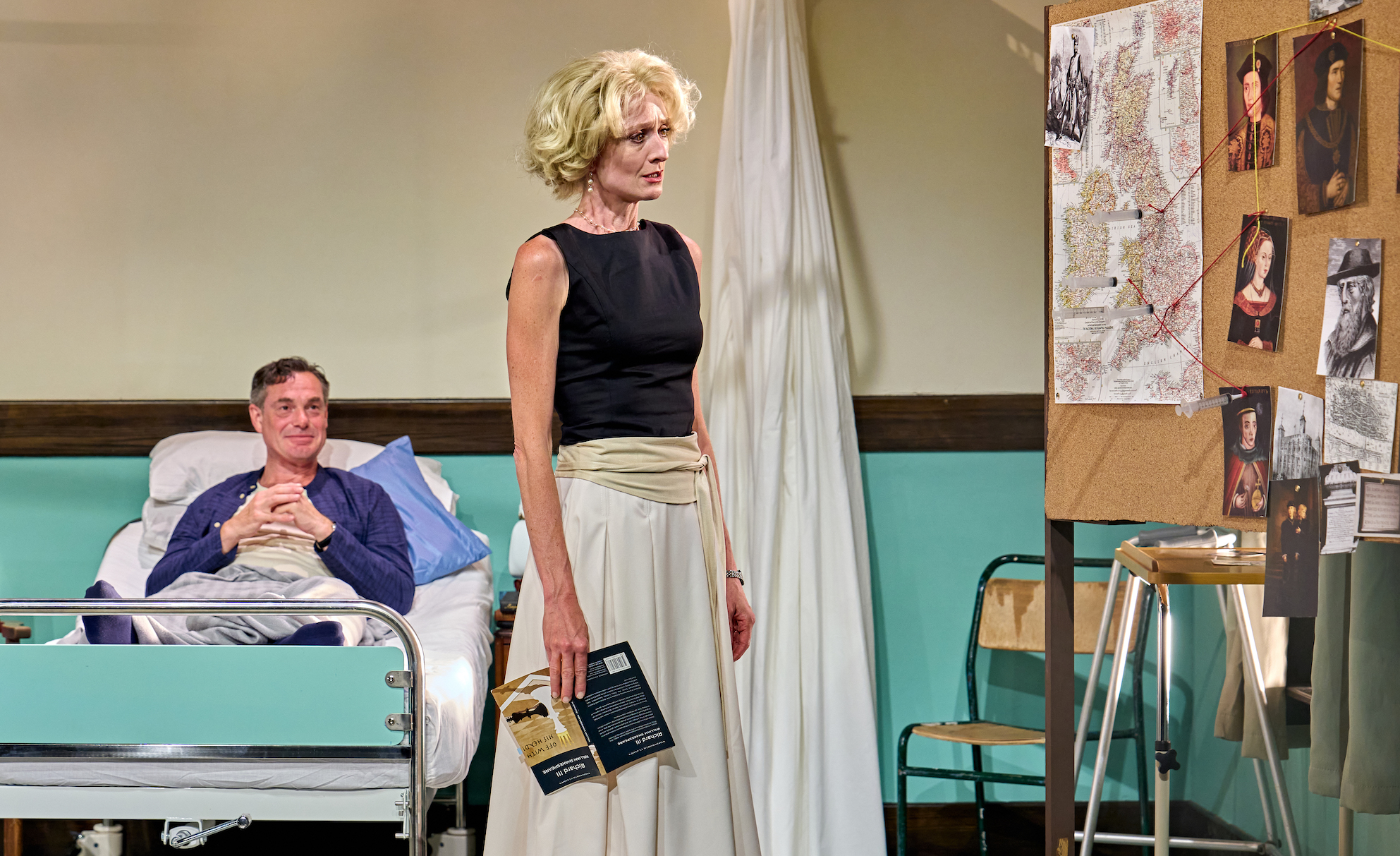The Daughter of Time, Charing Cross Theatre review - unfocused version of novel that cleared Richard III | reviews, news & interviews
The Daughter of Time, Charing Cross Theatre review - unfocused version of novel that cleared Richard III
The Daughter of Time, Charing Cross Theatre review - unfocused version of novel that cleared Richard III
The writer did impressive research but shouldn't have fleshed out Josephine Tey’s story

Following confirmation that he was the owner of the bones found in a Leicester car park in 2012, Richard III has never been a hotter, or cooler, subject. So his fans will welcome a new play, based on an old book, about the misrepresentation of his character. The uninitiated, possibly not so much.
The old book in question is Josephine Tey’s much loved The Daughter of Time (1951), in which a bored Scotland Yard type, Alan Grant (Rob Pomfret, pictured below right), bed-bound for six weeks with a broken leg, passes the time teasing out the truth (the “daughter of time”) about Richard: his character, his physical defects, his route to the throne, his role in the disappearance of his nephews from the Tower of London, his maligning by Shakespeare. It’s a terrific piece of detective fiction, though never allowing its hero out of his hospital room.
 M. Kilburg Reedy’s policemen, Grant and Sergeant Williams (Sanya Adegbola), treat the case as they would any other that landed on their desks, even setting up a rolling noticeboard to pin portraits and maps on, as in every good TV incident room. They are operating on a hunch about Richard, born of all their dealings with criminals, that in his only surviving portrait he simply doesn’t look like a villain. He doesn’t seem to have a hunchback or a gammy arm, either, and is actually rather handsome.
M. Kilburg Reedy’s policemen, Grant and Sergeant Williams (Sanya Adegbola), treat the case as they would any other that landed on their desks, even setting up a rolling noticeboard to pin portraits and maps on, as in every good TV incident room. They are operating on a hunch about Richard, born of all their dealings with criminals, that in his only surviving portrait he simply doesn’t look like a villain. He doesn’t seem to have a hunchback or a gammy arm, either, and is actually rather handsome.
Things get a lot more scientific than that, naturally, as Grant delves into the few available sources from the time, aided by Brent, an excitable American history student with a technique for wheedling access to key MSS out of a curator at the British Museum (it involves cheese). Slowly the trio begin dismantling Shakespeare’s compelling portrait of Richard the usurping murderer and set out an alternative account of what happened that credibly clears his name and suggests a new culprit.
Frustratingly, Reedy has felt obliged to inflate the material, adding minor characters to flesh out the story and extend its runtime, including foregrounding a daft romance between the detective and his glamorous actress friend Marta (Rachel Pickup, daughter of Ronald, pictured below with Rob Pomfret), who has to pretend to be marrying her best friend, leading man Nigel (Noah Huntley), to pique Grant’s interest in her. Even Grant can spot Nigel is “not the marrying kind”. Reedy also presents us with two comic-turn nurses and Brent’s actress girlfriend and her wealthy family, who loom large in his mind though we never meet them. Laconic Nurse Darroll, a northern Catholic who is a huge fan of Richard the Lionheart and hater of Richard of York, is played with a nice droll touch by Janna Fox, but her character doesn’t really move the story on except as an irritant who refuses to believe Richard is anything but a dastardly murderer, and as a loaner of history books to Grant. Thanks to her, audience members not totally up to speed with the Plantagenets have to take on board Richard I’s genealogy too.
Reedy also presents us with two comic-turn nurses and Brent’s actress girlfriend and her wealthy family, who loom large in his mind though we never meet them. Laconic Nurse Darroll, a northern Catholic who is a huge fan of Richard the Lionheart and hater of Richard of York, is played with a nice droll touch by Janna Fox, but her character doesn’t really move the story on except as an irritant who refuses to believe Richard is anything but a dastardly murderer, and as a loaner of history books to Grant. Thanks to her, audience members not totally up to speed with the Plantagenets have to take on board Richard I’s genealogy too.
Theatre-mad Nurse Ingham (Hafsa Abbasi), meanwhile, emerges from the opening night party for Nigel’s Richard III (pictured below left) – a production we catch glimpses of, performed in front of a red curtain – with a job as a theatre critic on the Evening Standard. Seriously?
An irony begins to emerge: just as Grant and Brent come to question the source of every “fact” in the case that paints a negative portrait of Richard – especially Thomas More’s glaringly error-strewn “history” of him, the prime source for Holinshed’s Chronicles, a tome used extensively throughout his career by one William Shakespeare – you come to nitpick small details in Reedy’s script. Is Grant that rare breed, a busy workaholic cop who still manages to sustain a serious theatregoing habit and can quote screeds of Shakespeare? He can even do a passable impersonation of Olivier’s Richard, with its distinctive delivery, when only the stage version would have been available to him; the film version didn’t appear until 1955, six years after the setting of Reedy’s play.
 Are we to ignore Grant’s obvious forensic intelligence and believe the script, which paints him as a bit of a buffer, a sticklerish bachelor whose feelings “come out sideways”, as Nigel says? He emerges, Janus-faced, as both a super-sleuth and a chump. Do we really need all the silly faux-fiancé plotting by Marta and Nigel over supper at the Ivy – they sit under a familiar diamond-latticed window, at a corner table that neatly swings in and out of the set. They even start choosing the cake. Did British nurses actually wear black stockings and white shoes? And did fashionable actresses go out during the day without hats or a back to their dresses? These little niggles sit oddly alongside the fact that Reedy’s research seems to have led her to conclusions about Richard’s story that, intriguingly, go beyond Tey’s speculations, including the fate of the Princes. But only a devoted fan would notice that. Which is a shame as this spadework is a lot more interesting and impressive than her embellishments.
Are we to ignore Grant’s obvious forensic intelligence and believe the script, which paints him as a bit of a buffer, a sticklerish bachelor whose feelings “come out sideways”, as Nigel says? He emerges, Janus-faced, as both a super-sleuth and a chump. Do we really need all the silly faux-fiancé plotting by Marta and Nigel over supper at the Ivy – they sit under a familiar diamond-latticed window, at a corner table that neatly swings in and out of the set. They even start choosing the cake. Did British nurses actually wear black stockings and white shoes? And did fashionable actresses go out during the day without hats or a back to their dresses? These little niggles sit oddly alongside the fact that Reedy’s research seems to have led her to conclusions about Richard’s story that, intriguingly, go beyond Tey’s speculations, including the fate of the Princes. But only a devoted fan would notice that. Which is a shame as this spadework is a lot more interesting and impressive than her embellishments.
There are some funny moments, most of them provided by Harrison Sharpe as Brent, who has a habit of writing vital intel on little pieces of paper and storing them in his clothing, including his shoe. His exuberance leads him at one point to do a somersault that turns him into a human pretzel. He is the standout in the cast, giving it more of a pulse. But its hero has been mislaid: it should be the misjudged Richard of York, not a tetchy repressed detective who strains credulity.
- The Daughter of Time is at Charing Cross Theatre until 13 September
- More theatre reviews on theartsdesk
The future of Arts Journalism
You can stop theartsdesk.com closing!
We urgently need financing to survive. Our fundraising drive has thus far raised £49,000 but we need to reach £100,000 or we will be forced to close. Please contribute here: https://gofund.me/c3f6033d
And if you can forward this information to anyone who might assist, we’d be grateful.

Subscribe to theartsdesk.com
Thank you for continuing to read our work on theartsdesk.com. For unlimited access to every article in its entirety, including our archive of more than 15,000 pieces, we're asking for £5 per month or £40 per year. We feel it's a very good deal, and hope you do too.
To take a subscription now simply click here.
And if you're looking for that extra gift for a friend or family member, why not treat them to a theartsdesk.com gift subscription?
more Theatre
 Top Hat, Chichester Festival Theatre review - top spectacle but book tails off
Glitz and glamour in revived dance show based on Fred and Ginger's movie
Top Hat, Chichester Festival Theatre review - top spectacle but book tails off
Glitz and glamour in revived dance show based on Fred and Ginger's movie
 Edinburgh Fringe 2025 reviews: Alright Sunshine / K Mak at the Planetarium / PAINKILLERS
Three early Fringe theatre shows offer blissed-out beats, identity questions and powerful drama
Edinburgh Fringe 2025 reviews: Alright Sunshine / K Mak at the Planetarium / PAINKILLERS
Three early Fringe theatre shows offer blissed-out beats, identity questions and powerful drama
 The Daughter of Time, Charing Cross Theatre review - unfocused version of novel that cleared Richard III
The writer did impressive research but shouldn't have fleshed out Josephine Tey’s story
The Daughter of Time, Charing Cross Theatre review - unfocused version of novel that cleared Richard III
The writer did impressive research but shouldn't have fleshed out Josephine Tey’s story
 Evita, London Palladium review - even more thrilling the second time round
Andrew Lloyd Webber's best musical gets a brave, biting makeover for the modern age
Evita, London Palladium review - even more thrilling the second time round
Andrew Lloyd Webber's best musical gets a brave, biting makeover for the modern age
 Maiden Voyage, Southwark Playhouse review - new musical runs aground
Pleasant tunes well sung and a good story, but not a good show
Maiden Voyage, Southwark Playhouse review - new musical runs aground
Pleasant tunes well sung and a good story, but not a good show
 The Winter's Tale, RSC, Stratford review - problem play proves problematic
Strong women have the last laugh, but the play's bizarre structure overwhelms everything
The Winter's Tale, RSC, Stratford review - problem play proves problematic
Strong women have the last laugh, but the play's bizarre structure overwhelms everything
 Brixton Calling, Southwark Playhouse review - life-affirming entertainment, both then and now
Nostalgic, but the message is bang up to date
Brixton Calling, Southwark Playhouse review - life-affirming entertainment, both then and now
Nostalgic, but the message is bang up to date
 Inter Alia, National Theatre review - dazzling performance, questionable writing
Suzie Miller’s follow up to her massive hit 'Prima Facie' stars Rosamund Pike
Inter Alia, National Theatre review - dazzling performance, questionable writing
Suzie Miller’s follow up to her massive hit 'Prima Facie' stars Rosamund Pike
 A Moon for the Misbegotten, Almeida Theatre review - Michael Shannon sears the night sky
Rebecca Frecknall shifts American gears to largely satisfying effect
A Moon for the Misbegotten, Almeida Theatre review - Michael Shannon sears the night sky
Rebecca Frecknall shifts American gears to largely satisfying effect
 Burlesque, Savoy Theatre review - exhaustingly vapid
Adaptation of 2010 film is busy, bustling - and bad
Burlesque, Savoy Theatre review - exhaustingly vapid
Adaptation of 2010 film is busy, bustling - and bad
 Don't Rock the Boat, The Mill at Sonning review - all aboard for some old-school comedy mishaps
Great fun, if more 20th century than 21st
Don't Rock the Boat, The Mill at Sonning review - all aboard for some old-school comedy mishaps
Great fun, if more 20th century than 21st
 The Estate, National Theatre review - hugely entertaining, but also unconvincing
Comedy debut stars Adeel Akhtar, but is an awkward mix of the personal and the political
The Estate, National Theatre review - hugely entertaining, but also unconvincing
Comedy debut stars Adeel Akhtar, but is an awkward mix of the personal and the political

Add comment